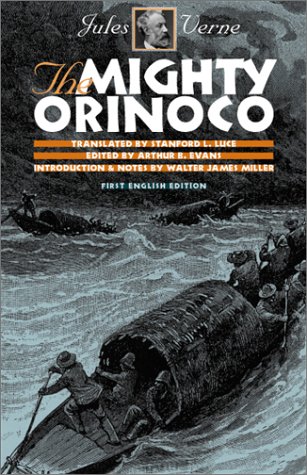The Mighty Orinoco
Superbe Orénoque (Le) (1898)
Member Andrew Nash’s website contains all the English variations of this title.Plot Synopsis:
(courtesy of member Dennis Kytasaari’s - website)
Three geographers, M. Miguel, M. Felipe and M. Varinas argue amongst themselves about the location of the headwaters of Venezuela’s mighty Orinoco River. They decide to make a journey up river to settle their disagreement. At the same time, Sergeant Martial and his nephew Jean are also making this same journey, although their journey is for a different purpose. They are seeking out Jean’s father, who they hope may still be found living somewhere far upriver. The two parties meet and travel together and are soon joined by another party, Jacques Helloch and his friend Germaine Paterne. The parties on their travels upriver overcome many obstacles, but the result one adventure finds Jacques with a strange attraction to Jean. More than the source of the Orinoco will be discovered before this trip is over.
For audio recommendations for this title, click here.
Review(s)
The Mighty Orinoco (Early Classics of Science Fiction)
Translator: Stanford L. Luce. Introduction & Notes: Walter James Miller; Editor:
Arthur Evans. Middletown, CT, Wesleyan University Press, 2003. 448 pages, ?? ill.
Hardcover — ISBN-10: 0819565113, ISBN-13: 978-0819565112
Softcover — ISBN-10: 0819567809, ISBN-13: 978-0819567802
RECOMMENDED (read why below) Get it
at Amazon.com.
Like many people, I have not read any of the works of Jules Verne, I just saw the
movies. When I told one friend I was reading the first English edition of Verne’s
The Mighty Orinoco, I got a look of pity and the comment that Verne was
a dry read. But not so! As Walter James Miller points out in the introduction to
this book, the standard English versions of Verne are flawed by inaccurate translations,
political editing, and removal of some text. This new translation is not only better,
but includes numerous annotations that increased my enjoyment of the work. These
show that The Mighty Orinoco is a novel of scientific discovery, of adventure
and of the human need for each other.
The plot revolves around two expeditions going up the Venezuelan river Orinoco.
One is a group of three scientists who are searching for the source of this river:
echoes of the search for the source of the Nile are not accidental, as Verne knew
the public was thrilled by such adventures. The second group of travelers is Sergeant
Martial and his nephew Jean. They are searching for Jean’s father who settled
along the river after an accident killed his wife and he believed also his son.
One could say they are also search for a source: the source of Jean.
The trip up the river has beauty, mystery and excitement. Verne includes many details
of the region, touching on the wildlife and the people living near the river. In
parts, it is almost a travelog. But there is danger, both from the Orinoco with
its rapids and wild animals, and from hostile Indians and bandits that prey on river
traffic. Throughout, there are hints that show the various opinions of the author.
Not all are comfortable to us: Verne describes many of the natives as “savages”
and he is careful to point out that the three Venezuelan scientists are of European
background with “not a single drop of Negro blood”. In other areas,
he is ahead of his time: after describing a large river turtle, Verne commented
that over-hunting of the eggs had already reduced the population so that “the
species could disappear someday”.
There is more to The Mighty Orinoco than a travel narrative. Adventures
come from nature and man: earthquakes and fires threaten the travelers as much as
the violence and greed of men. Beyond adventure, Verne touches on social topics
and has an intriguing look at gender roles with an interesting view on the appropriate
place for young women. As with many of his works, his French bias shows, which is
one of the reasons The Mighty Orinoco was not translated into English when
first published. His political and social comments were somewhat radical for his
day and he often used the British as the villains of his works, a issue for contemporary
translators who were British themselves. By the time this work appeared, there were
other authors of scientific romance who did not espouse Verne’s problematic
opinions, so The Mighty Orinoco was not known to English readers until
now.
This delay is to your advantage. Before you is an accurate translation, with no
missing parts or gratuitous edits. It is a work full of science, wonder, and adventure,
the hallmark of a Jules Verne story. It cannot be overstated how much the Miller’s
notes add to this work: not only does he explain contemporary issues, but he also
enriches the text with current information on the area. If you have never read Jules
Verne, this is a good start and if you have, try this work and see if it exceeds
your previous Verne experience.
 © 1993 - 2026 North American Jules Verne Society, Inc. — a 501(c)(3) Corporation
© 1993 - 2026 North American Jules Verne Society, Inc. — a 501(c)(3) Corporation
